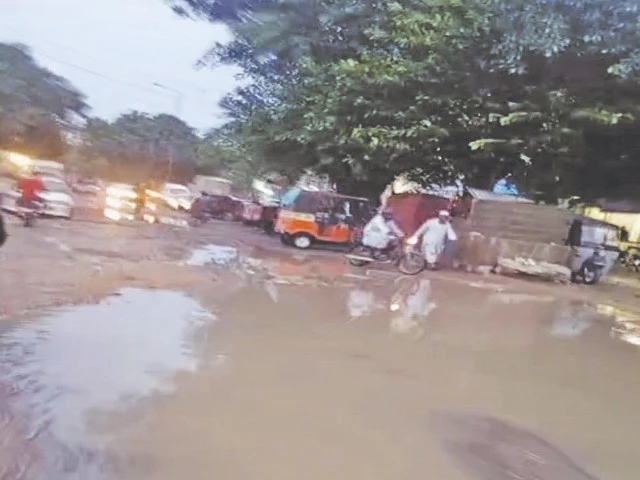Karachi:
The situation in several neighborhoods in the metropolitan-Isarence Gullhan-e-Iqbal-is worsened alarmingly after the accounts of August 19, with the residents facing enormous difficulty in the midst of crowded wastewater, broken roads and a seeming lack of answers from the municipal authorities.
According to reports, several blocks of Gullhan-E-IQBAL, including 13-D/2 and 13-D/3, have been hit hardest. Streets remain flooded with stagnant wastewater, while roads have developed dangerous cracks and holes, making them almost unacceptable for both pedestrians and vehicles.
In block 13-d/2, near the city’s land, both main roads are submerged in wastewater. The residents say the situation has gone from bad to worse, with the damaged roads that make daily commutes for a nightmare. The presence of illegally parked rickshaws on paths is further added to the chaos, creating serious obstacles for pedestrians trying to navigate the flooded area.
Similarly, the citizens of Block 13-D/3 report the Nauman complex that even motorcycles and cars are struggling to pass. The roads are broken, smooth and filled with dirt. Going, the residents claim is no longer an option.
“The streets are no longer recognizable. This is not just an inconvenience, it is a health hazard,” said a local resident, frustrated with the lack of the authority’s visible efforts to remedy the situation.
Adding to public anger is the absence of local municipal officials. Near the Phatak railway, accumulation of wastewater has not only caused serious traffic disorders, but also raised concerns about waterborne diseases. Despite repeated trials, citizens have failed to establish contact with elected representatives.
Union Council President and Guldhan-E-Iqbal City Chair, dr. Fawad-Begge associated with Jamaat-e-Islami has been unattainable, with their phones reportedly turned off.
The locals say they feel abandoned by those who were chosen to serve them. “They come to voices, but disappear when it comes to action,” another resident said and stood ankle deep in wastewater outside his home.
When residents start moving from the worst affected blocks, the silence and passivity of the authorities raises serious issues of disaster preparedness and governance in the country’s largest metropolis.
Despite being a recurring problem every monsoon, the city’s drainage and road infrastructure remain grossly neglected. Without any official response in sight, citizens are left to fit themselves again and pay the price of administrative apathy and political indifference.



